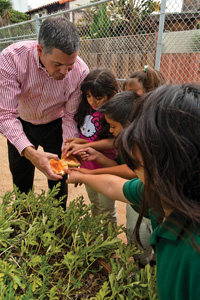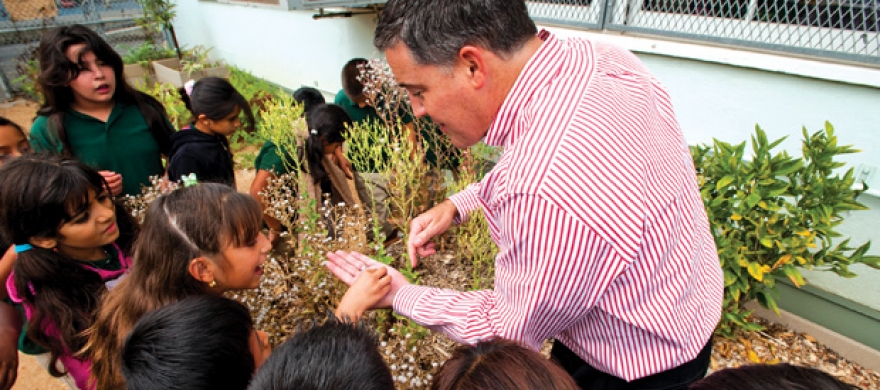Ripe for Change
Alumnus Thomas Bangert works to create sustainable changes in students’ diets.
Two centuries ago in the earliest days of kindergarten classrooms, children learned the basics of nature before being introduced to the rigor of the ABCs and 123s. The approach was meant to integrate their language and math lessons with what they already knew about their environment. “It was a good introduction to get kids to transition from being at home with their family to the school site,” explains Graduate School of Education and Psychology alumnus and elementary school teacher Thomas Bangert (’97, MS ’09).
Modern classrooms, however, show a different scene and a clearer divide between the natural environment and classroom setting. So Bangert has taken the “nature first” concept of kindergarten (German for “children’s garden”) and developed a modern K-5 curriculum based on what students used to learn from the beginning.
“A lot of people around this planet still do farm and rely on fresh produce,” says Bangert, who became a master gardener in 2007. “I thought of how I could reintroduce this concept to kids of kindergarten age and see what would happen over a few years.” Carrying this idea with him throughout his 13-year teaching career, Bangert applied it to his GSEP leadership project called the LA Human Garden, an elementary curriculum resource encouraging the study of food systems focused on sustaining the environment, growing, and cooking.

Students also visit nearby farmers’ markets to sample local crops and become more aware of the fresher options that exist around them. “Many students rely a lot on quick, fast food—only what they get at school—but I want them to understand we have a responsibility and the ability to grow our own food, share flavors, and trade fruits and vegetables.”
Not all children, though, are fortunate enough to have that ability. Through his research, Bangert learned that out of 650,000 total students in the Los Angeles Unified School District (LAUSD), 80,000 children in smaller, underfunded schools were being served mostly chemicalized and commodified foods. “The idea that these foods are passed off on our children is a crime of sorts; a true social justice issue,” he laments.
In an effort to make a difference in district-wide school meal programs, Bangert recently joined celebrity chef Jamie Oliver’s Food Revolution, a grassroots campaign to educate communities about the unhealthy food options present in American schools. “When I look at our food system for these kids, none of the adults eat the food,” says Bangert, who is now a social justice advocate for schoolchildren. “Unfortunately, that’s all that’s left for them and that’s what Jamie Oliver saw.”
Bangert’s role involves brainstorming with Oliver and a cohort of 15 teachers to change the system on behalf of the children. One of their first steps has been putting cafeterias back to work and teaching children about food procurement and preparation—what Bangert calls basic life skills. “The whole idea is that we have to teach it hands-on,” he explains. “When you show a child how to cook, when you physically demonstrate it, then they can see it and actualize it.”
While he continues to write the curriculum necessary to build a new literacy for growing, preparing, and sharing food in schools in his district, Bangert will soon take his crusade out of the classroom and into children’s homes. He is currently working with an animation studio to develop a series to teach kids about earth, physical, and life science through animated characters he has envisioned. “A lot of parents and teachers, even administrators, feel like they are faced with this reality that they can’t really change, and that’s not true,” contends Bangert, whose tireless pursuits continue to shed light on the possibilities available to change food systems for children.
“You have to be an agent of change,” he asserts. “When you can effect change on a local level by changing the status quo, that wakes people up to their reality and revitalizes their passion to change what they’ve accepted for a long time. Now people see there are better choices out there for food. That’s now the new shift.”
